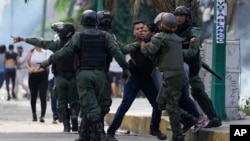It’s been two months since the Venezuelan people cast their ballots and chose Edmundo González Urrutia to be their president. Their rejection of Nicolás Maduro, who has wielded power in Venezuela for over a decade, was decisive, as the United States and other democratic countries have acknowledged. But Maduro and his allies continue to reject the will of the Venezuelan people. With no evidence, Maduro insists he won, and, threatened with arrest and imprisonment, Edmundo González has been forced into exile in Spain.
At a recent Congressional hearing, Enrique Roig, U.S. Deputy Assistant Secretary of State for the Bureau of Democracy, Human Rights and Labor, said post-election repression in Venezuela “has been both severe and unprecedented in the country’s history:”
“Nicholas Maduro’s regime has resorted to a campaign of violence and intimidation aimed at suppressing the democratic opposition and the Venezuelan people. As of September 9th, there have been 24 deaths and over 2000 detentions,” he said. “The daily average number of detained or disappeared is nearly ten times higher than the pre-election average. Security forces routinely stop citizens to review their WhatsApp messaging chats for potential organizing involvement and deployed an app for Maduro sympathizers to report suspected efforts to assemble.”
In addition, an anti-NGO law passed by Maduro’s National Assembly in August, along with revival of a law against fascism, “highlight Maduro’s intention to undermine civil society,” said Deputy Assistant Secretary Roig:
“These laws are designed to make it nearly impossible for NGO’s and opposition organizations to operate in Venezuela, limiting their ability to provide services, organize, or campaign freely.”
The United States and international partners have signaled to Maduro and his representatives that their fraudulent claims about the election and their subsequent repression of Venezuelan citizens are unacceptable. On September 12, the U.S. Departments of Treasury and State announced sanctions and visa restrictions on Maduro-aligned officials for their role in election manipulation and repression. Democratic governments in the region and beyond have joined with the United States in pressuring Maduro for transparency and for an end to violations of the rights of Venezuelans.
The United States, said Deputy Assistant Secretary Roig, “will continue to work tirelessly with the international community to apply pressure, demand accountability, and support those who are fighting for a free and democratic Venezuela.”






